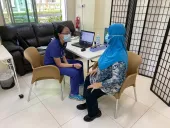
Indonesia's pursuit of universal healthcare to remain difficult
Only 70% of Indonesians were enrolled in national health insurance scheme.
First rolled out in January 2014, the authorities aim to have fully enrolled the population into the national health insurance scheme by January 2019 - called the Jaminan Kesehatan Nasional (JKN) - while ensuring that 'high quality healthcare services' are equally accessible to the entire population.
According to BMI Research, latest estimates suggest that only 70% of the population were enrolled as of September 2017.
Crucially, the lack of general infrastructure in rural areas to support healthcare services will need to be addressed, in conjunction with the lack of government financing. Financial sustainability will remain an ongoing challenge for Indonesia's universal healthcare programme and as a percentage of GDP, healthcare spending stood at 2.9% in 2016.
Here's more from BMI Research:
Furthermore, drugmakers in the country will continue to face significant impediments to medicine sales growth over the short term on account of the inequality of healthcare coverage.
Indonesia has a highly fragmented healthcare system made up of a mixture of public and private healthcare providers, which results in large proportions of the population unable to access high quality care. The country's underdeveloped medical system will impinge upon its ability to achieve universal healthcare as defined by the government.
The level of healthcare access diverges significantly across the country, with regions such as the Special Region of Yogyakarta having 13 hospital beds per 10,000 in 2016 while Central Sulawesi had 8. While the expansion of private healthcare providers such as Siloam International hospitals will improve healthcare access, it is unlikely to significantly alter the current healthcare landscape in the short term.













 Advertise
Advertise













